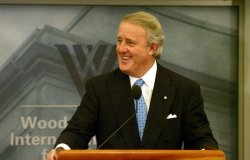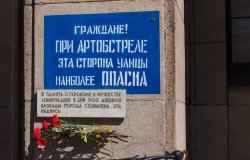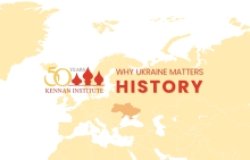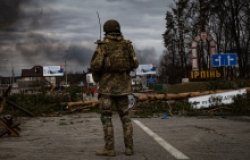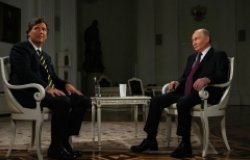Implications of the Elections in Yugoslavia for U.S. Interests in the Balkans
John Hulsman, Damjan de Krnjevic-Miskovic, and Philip W. Lyon
Overview
Summary of the East European Studies discussion with John Hulsman, a Research Fellow for European Affairs at the Davis Institute for International Studies of the Heritage Foundation, DC; Damjan de Krnjevic-Miskovic, the Assistant Managing Editor of The National Interest, DC; and, Philip W. Lyon, a Doctoral Candidate in the Department of History at the University of Maryland, MD.
John Hulsman concentrated on the recent elections in Bosnia, which resulted in the return of the nationalist parties to power in that country, stressing that these elections represented a real failure of the seven year international effort to build a democratic, non-nationalist state in that area. Hulsman enumerated the problems of nation-building, whether it is in a country such as Iraq, Bosnia or Kosovo, and emphasized that if the U.S. must embark on nation-building, it should be in areas where our strong national interests lie – that would be Iraq and not the Balkan states. He also discussed the various problems that have confronted the international community in Bosnia over the past seven years, citing particularly the problem that international representatives there have come to act like viceroys, imposing key political and economic decisions on recalcitrant local leaders. This phenomenon has resulted in a fragile and superficial peace and stability, but only at the cost of sustained international involvement. He noted that the populations of the Balkans, as well as of our European allies, recognize that direct U.S. involvement in these nation-building efforts in the Balkans is gradually diminishing. The only way that lasting peace and stability can be maintained in the region is if the local and regional leaders are committed to that goal, and this is not imposed from the outside. He suggested that the long-term solution to the problems of the former Yugoslav states rests on regional solutions founded on back door diplomacy with direct negotiations between all the parties. Only in this way could the necessary trade-offs be made that could eventually resolve existing territorial and state sovereignty issues.
Both Damjan and Philip Lyon focused on the existing struggles within the former Yugoslavia and especially Serbia to institute democratic reform. Both looked at the recent presidential elections in Serbia in September and October, which were invalidated due to low voter turn-out. Damjan gave a more upbeat assessment of the situation, claiming that the current splits between President Kostunica and Prime Minister Djindic were in the process of being resolved. He also addressed the current scandal involving the transfer of Yugoslav military equipment, technology, and expertise to Iraq, claiming that the government of Serbia was not involved in these transfers. Instead, he argued that these arms sales were really examples of corruption carried out by retired military personnel, unbeknownst to the government, under the cover of phony commercial enterprises. Philip Lyon emphasized the failure of state-building in Yugoslavia, referring to it as a "zombie state" that was refusing to reform itself. He stressed the dysfunctional aspects that characterize much of the Serbian government and economic reform efforts, citing these failures as reasons helping to fuel the independence movements in both Montenegro and Kosovo.
Hosted By

Global Europe Program
The Global Europe Program is focused on Europe’s capabilities, and how it engages on critical global issues. We investigate European approaches to critical global issues. We examine Europe’s relations with Russia and Eurasia, China and the Indo-Pacific, the Middle East and Africa. Our initiatives include “Ukraine in Europe” – an examination of what it will take to make Ukraine’s European future a reality. But we also examine the role of NATO, the European Union and the OSCE, Europe’s energy security, transatlantic trade disputes, and challenges to democracy. The Global Europe Program’s staff, scholars-in-residence, and Global Fellows participate in seminars, policy study groups, and international conferences to provide analytical recommendations to policy makers and the media. Read more
Thank you for your interest in this event. Please send any feedback or questions to our Events staff.



